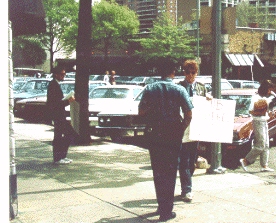|
Yet, almost every rule has its exceptions, and this rule is no exception to that rule. In 1946, the Court considered the issue of the First Amendment's applicability in Chickasaw, Alabama--a company town owned lock, stock, and barrel by Gulf Shipbuilding. A Jehovah's Witness came to Chicasaw and began distributing religious literature on a street corner. She was told to stop her activity. She refused, and was tried and convicted of trespass. The Court reversed her conviction, concluding that Chicasaw was the functional equivalent of a municipality, the residents of Chicasaw citizens of Alabama, and that the First Amendment fully applied to expressive activities on the company-owned sidewalks and streets of the town. In 1968, at the height of the liberal Warren Court, the rule in Marsh was extended in Logan Valley to protect expressive activity in the parking lot of a shopping center. The Court reasoned that shopping centers today function much like the downtown business districts of previous eras. Today, many people never visits central business districts and if they are to be reached at all, it is only in the suburban shopping complex. In 1976, in Hudgens v NLRB, the Court reversed course and overruled Logan Valley. The Court noted that in a case decided in 1972 it had limited Logan Valley to speech that related in some way to one of the businesses in a shopping center, ruling in 1972 that there was no First Amendment right to engage in anti-war leafletting at a large suburban mall. The Court concluded that the rationale of Logan Valley had been rejected in 1972, and now it was time to bury Logan Valley altogether. The Court indicated, however, that the company-town situation of Marsh remains one in which it will protect expressive activities even though they take place on private property. Hudgens has not been the end of the story. Several state supreme courts have concluded that the free speech protections of their own state constitutions protect the right of citizens to engage in expressive activities in the public areas of shopping centers. Most notable, perhaps, is the California Supreme Court's Pruneyard decision. The Court found constitutional protection for high school students who were soliciting signatures at a 65-store mall opposing a U. N. resolution on "Zionism." The shopping center owner took the case to the U. S. Supreme Court in 1980, arguing that the California Supreme Court's decision amounted either to a violation of his First Amendment rights or a taking of his private property. The U. S. Supreme Court unanimously rejected both arguments. Questions 2. If you believe that people should have a right to picket or leaflet at shopping malls, what about the large "stand-alone" stores such as Wal-Marts and Targets? 3. Large numbers of people spend almost all their time either at private homes, private workplaces, privately-owned shopping centers, and other privately-owned venues such as multi-screen movie houses. They may only very rarely visit the traditional public forum of the downtown business district or public parks. Shouldn't the First Amendment be interpreted to allow some place to reach these folks through such traditional free speech activities as leafletting? |
Marsh v Alabama (1946) Amalgamated Food Employees Union v Logan Valley Plaza (1968) Hudgens v NLRB (1976)
|

